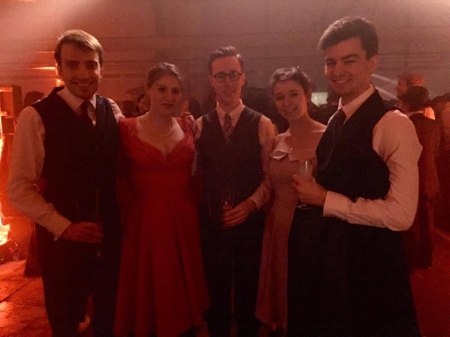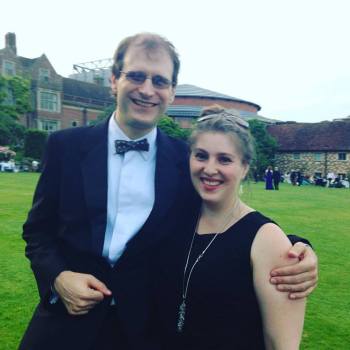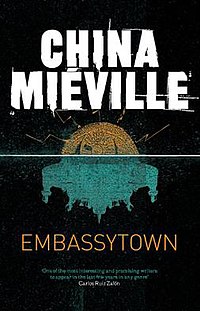
Usually, holidays are a delightful excuse to do All The Reading. When I went home for two weeks in the middle of this month, though, I… didn’t. There are a couple of reasons for this, I think. One is that I read a lot for my actual job, and I would read at least as much if I weren’t a bookseller, anyway. Another is that I was having a really hard time focusing: my parents live about ten miles outside of Charlottesville, Virginia; I went to school there. The intersection where Heather Heyer was murdered by a Nazi is the same intersection where my dad used to pick me up from my weekend job. My best friend was punched in the face by a Nazi that Saturday. It’s one thing to see this in the media; it’s another to see, in the background of the news photos and footage, landmarks as familiar and dear to you as your own hand. A third reason is that, perhaps in order to distract us all from that heinous shit, my parents had me on a heavy schedule of visiting old and new friends, drinking wine in central Virginia’s many vineyards, going to restaurants and art exhibits, and generally Keeping Busy. Reading fell by the wayside a little.
I did read some books while I was there—more on those in August Superlatives at the end of the month. Perhaps more importantly, my dad and I had a Grand Day Out near the end of my visit, which consisted of a ridiculously delicious meal, complete with dessert wine, followed by a tour of downtown Charlottesville’s many bookshops. (I even managed to introduce him to some he’d never been into!) Herewith, a rundown of purchases:
Coding Freedom by E. Gabriella Coleman—from Blue Whale Books (secondhand fiction and general nonfiction; modern first editions; antiquarian Virginiana and maps[!]) I’ve wanted to read this ever since I read The Idealist, Justin Peters’s biography of Aaron Swartz. Coleman writes about the ethics of hacking, free culture, and free/open source software. It’s not particularly technical, so my low code-reading ability is no handicap; it’s heavier on legal and philosophical arguments. It’s also actually on my Goodreads TBR.
Roughing It by Mark Twain—from Read It Again Sam (secondhand general fiction, children’s, huge thriller and sci-fi sections) My dad adores Mark Twain. He has previously told me to read both Roughing It and The Innocents Abroad, Twain’s American and European travelogues. Read It Again Sam’s copy of Roughing It was slightly smaller and in paperback, so the choice was obvious. I’m reading this now and it is simply delightful: detailed, observant, and dryly funny as hell.
Mystery and Manners by Flannery O’Connor—from Daedalus Books (If you ever go to Charlottesville, you must go here. It is owned by Sandy McAdams, who has had MS and been in a wheelchair for at least as long as I can remember, and who yet continues to run this three-storey townhouse on the corner of 4th and Market, crammed to the literal rafters with secondhand paperbacks. The place is a labyrinth of treasure.) I’ve loved Flannery O’Connor since I wrote a paper on her short stories at the end of my junior year in high school. That paper got me into Oxford. Since then, I’ve moved from uncritical adulation to a kind of baffled fascination—you can never quite tell what O’Connor thinks, and I’ve started believing that she’s far less healthy and/or generally correct than I previously thought—but her voice is undeniable and addictive. This is a collection of her essays and lectures; irresistible.
The Devil In Silver by Victor LaValle—from New Dominion Bookshop (I worked at New Dominion all through high school. The proprietor, Carol Troxell, was a beloved mentor and role model; when I went to university, she took me to lunch, gave me a pair of pearl earrings and told me never to open a joint bank account with a man. She died very unexpectedly earlier this year, and for a while the shop’s future was in doubt. As of my visit, her husband Robert had hired a manager, Julia, who has done amazing things with the shop stock and generally modernised some of its more antiquated aspects. It’s in good hands.) The best thing to do in a bookshop if you have no particular agenda, but want to buy something, is to go straight to a bookseller, ask them to recommend you one paperback book, and then buy it—no questions asked, no arguments. This is what happened at New Dominion; Robert (not Carol’s husband, a different Robert) recommended The Devil In Silver, an allegorical horror novel set in an insane asylum. I’ve heard of LaValle and I love how Robert described him: as someone working in a Lovecraftian tradition, but whose motivating horror is the fear of institutionalised racism, as opposed to Lovecraft’s fear of the racial Other. Sign me up.
Like a Mule Bringing Ice Cream to the Sun, by Sarah Ladipo Manyika—from New Dominion Bookshop Because Naomi loved it, and described it as being about “a woman in her 70s who’s lived a varied life, unafraid to dress as she pleases, contemplate tattoos, read voraciously and discuss sexuality and how she’s found life as a woman and as a person of colour.” Uh, YES.
I also had a Grand Day Out with my younger brother Nick, which resulted in some book purchases. Three of them came from Telegraph Comics, a new art and comic shop downtown which has a great, highly curated graphic novels section: I bought volume 3 of Saga, Brian K. Vaughan’s intergalactic love-story-against-great-odds that features my beloved Lying Cat (and some more naked people), volume 1 of Y: the Last Man by the same writer, which posits a world where all men but one—Yorick—have been killed by a gendered virus, and The Case of the Team Spirit by John Allison, the first collected Bad Machinery story (which you can read here, as well as Allison’s other [brilliant] work). Oh, and I also found a pristine copy of the Arden Shakespeare edition of King Lear for $4 in a junk shop in Ruckersville. Score!
I’ve already read Saga vol. 3 and The Case of the Team Spirit, and am working my way through Roughing It right now—which shall I choose next?
























